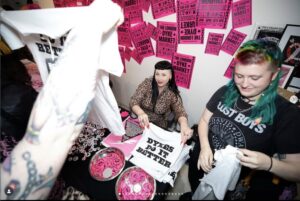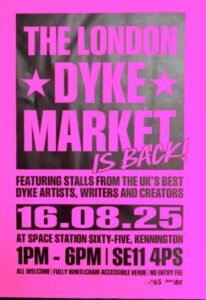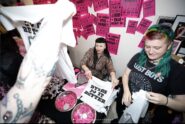
(A very young) Queerguru was so thrilled when we reclaimed the word queer for ourselves in the 1990’s transforming a historic anti-gay slur into a term of empowerment and pride. What we hadn’t realised until we were doing some research this morning was that gay women were ahead of men. In the early 1970’s they reclaimed the use of dyke as it empowered the lesbian community when before it had only been employed as a condemnation. (In 2017 the increasingly homophobic FACEBOOK censored the use of the word “dyke” on its website as “abusive content : a Change.org petition changed it back)
We use both these terms now with such a sense of pride and entitlement that shows our collective strength in an environment that can still be hostile at times.
There is such a sense of joy when we embrace these terms as out own, like this oast weekend , when there was the 2nd edition of the LONDON DYKE MARKET. Curated by activist Emily Witham, the event showcased work from over 30 participants, spanning ceramics, paintings, performance art, illustration, photography, textiles and much more. Styled as a ‘sapphic summer fête’, also featured tattooists, piercers and an ‘L Word’-themed kissing booth.

Witham told Nonchalant Magazine I launched The London Dyke Market as I was frustrated with the lack of spaces for dykes to showcase their work. My friends and members of my community around me were producing art, writing books, and creating remarkable things about contemporary lesbian culture, yet there were limited opportunities, beyond online platforms, to present these works to the very audiences they represented.
I wanted to create a space for dykes, by dykes, whereby people can purchase the work directly from the maker and put money back into the pockets of the community, far away from corporate sponsorships and unethical rainbow-adorned brand partnerships. Let’s start our own dykeconomy!
There is a legacy of great creativity and a ‘Do It Yourself’ attitude within UK lesbian culture. I’m deeply inspired by that history: by the women from Greenham Common, by the lesbian campaigners who abseiled into the House of Lords, and by those who chained themselves to the desks of the BBC Six O’Clock newsreaders live on air in 1988. That kind of bold, imaginative action has always been part of how our community has survived.
| To find out more, follow @thelondondykemarket on Instagram. |

